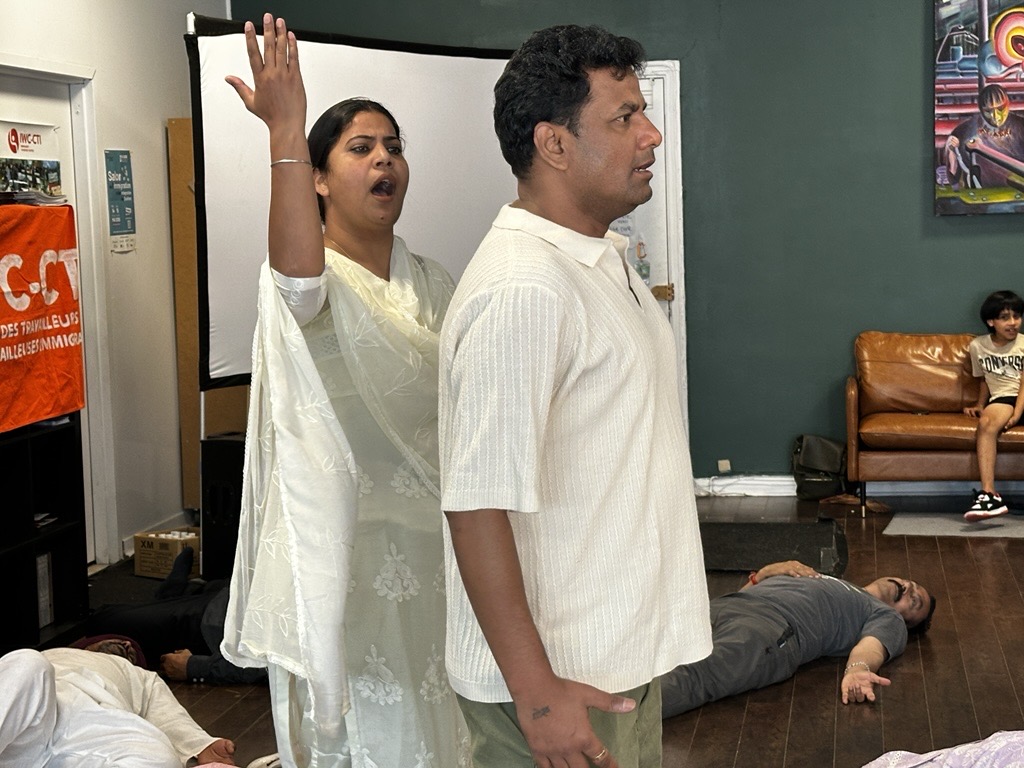Carousels, games of skill to win stuffed animals and cotton candy—these images are deeply rooted in the collective imagination of Quebecers, both children and adults who also experienced them in their own childhoods.
These traveling fairs, which set up temporarily in shopping mall parking lots or wherever they can find space, have been part of the landscape for decades, and if their owners are to be believed, they are here to stay.
“We never end up in the red; business is good,” says Véronique Vallée, co-owner of Beauce Carnaval, the oldest of the two companies of its kind that share the Quebec market. Some years, like this one with its cold and rainy April and May, are still more difficult than others, she says.
“We lost nine Saturdays at the beginning of the year. That hurts. But when people see that the weather will be nice on Friday or Sunday, they adjust. It’s not a total loss, but we did suffer a big loss because of the weather.”
She and her two brothers are the third generation to run Beauce Carnaval, founded in 1953 by their grandfather Florian, whose image can be seen on one of the horses of the magnificent traditional-style carousel.
The company operates two units that travel each year from the North Shore to Abitibi, the Outaouais, the Montérégie, the Eastern Townships, and the Lower St. Lawrence, passing, of course, through Beauce, the family’s home base, and everything in between.
The second of these companies, Fun Show, which also has two units in the territory, does not travel to remote areas, but still covers a vast territory stretching from the Laurentians to the Eastern Townships to the Quebec City region, passing through the Mauricie and Centre-du-Québec regions.
Founded 19 years ago, Fun Show, like Beauce Carnaval, is a financially demanding business, explains the sister of founder Mario Larivière, Sylvie, who is also his right-hand woman.
“People have no idea about the costs of operation, repair, maintenance, and relocation. We are 100 per cent self-sufficient. We provide our own electricity with generators and diesel fuel, which costs a fortune. The rent we have to pay where we set up shop is a lot of money, as is paying employees, housing them, and insurance. You have to have deep pockets.”
However, like her colleague Véronique Vallée, she says that business is going well despite everything. “It’s going really well. Obviously, we’re dependent on the weather, and our start to the season was difficult, but things have picked up. We ended the summer in the red only once.”
Mario Larivière built Fun Show from scratch, she says. “He started from nothing. He bought a few used rides, an investor who was willing to help him financed him, and he worked hard. My brother, it’s incredible! He was already good at mechanics and construction. The old rides were mechanical, but today there’s a lot of electronics, and it’s no longer the mechanics that break down, it’s always the electronics.”
Véronique Vallée and her two brothers obviously grew up at the fair. “When we finished school, we would come and spend our summers at the carnival. My two brothers and I all studied in other fields, but all three of us came back to the family business,” recalls the graduate in English teaching and law.
The two companies each employ around 100 people, a figure that can increase, as can the number of rides at large agricultural fairs where activity becomes more intense. However, they offer a different perspective when it comes to recruiting staff.
“It’s difficult to recruit because people are on the road for six months. They don’t see their families, they don’t stay at home, they don’t have Saturdays and Sundays off to go to the beach. That’s what characterizes this job, leaving, being a vagabond for six months,” explains Véronique Vallée, who adds, however, that she is blessed with a team of 34 Mexican seasonal workers who know each other and recruit each other.
“They’ve been with us since 2018. They help each other out, they’re a really great team, and when they’re here, they spread that spirit to others. Since they’ve been here, the atmosphere has been better, people help each other more, and there are no arguments.”
At Fun Show, René Caron, manager of one of the company’s two units, says that recruitment is not that difficult. “The old-timers come back year after year, and many of them bring friends with them. That’s how the team renews itself, and it’s still pretty easy.”
What attracts them, he says, is the feeling of having found a family. “Many don’t have families, many don’t have a permanent home. So they come here for the summer and the family atmosphere. They leave in the fall, but sometimes they go live together in groups of two or three. They come here to forge bonds.”
Salaries are not huge, slightly above minimum wage, but employees are paid on a weekly basis, so if it rains, for example, their salary remains unchanged. Also, carnival workers do not have to pay rent; they are housed in trailers that accompany the caravans from city to city.
Some, however, are paid on commission, particularly in games of skill, such as Félix Laplante, a young man from Gaspé who has been with Fun Show for four years. “I don’t have a base salary, but I don’t have a salary limit either. If it rains, I get teary-eyed, but if I have 4,000 customers in a day, it’s a great day!”
He comes back because he loves the work, adding that “there are ups and downs, as in any job. You have to be able to talk to each other. It takes motivation and you have to be able to live with your fellow human beings in a community. I have a very good place in the trailer with respectful people.”
Sylvain Gravel, a game operator at Fun Show, fell in love with the fairground scene 45 years ago. “I was 13 when I started. I sold popcorn and hot dogs at the Boston Circus, which came to my neighborhood in the summer and traveled with the agricultural shows. After moving on to the rides, he ended up in the games of skill. “That’s where I really found my place. Being with people, making people laugh. I really enjoy seeing the children, especially when they win and their eyes light up. Making people smile is very rewarding.”
All the workers we met say they are passionate about fair life. Encountered at the Beauce Carnaval site just as the unit had finished setting up in Victoriaville, Robert Gobeil and Sylvain Roy have been there since 1998 and 1992, respectively. “We love everything about it,” exclaims Robert Gobeil.
We’re here to entertain people. What could be better than entertaining people? I chose this job because we wanted to be able to work all summer and be in the south in the winter. Since 1998, we’ve been living in a motorhome year-round. This job is perfect for what I want to do. I leave in October and come back in April. After the pandemic, we decided to retire, but after the first season, we said no, we’re going back!”
Sylvain Roy, on the other hand, loves winter and goes snowmobiling during the off-season. He also left the carnival life in 2009, but like his colleague, he came back. “When you’ve got it in your blood, you come back. I love it. Beauce Carnaval is a family. We’re a family at home, but when we’re here, we have a family here too. Plus, we get to travel a lot.”
“And always,” he concludes, like all the others, “there are the smiles of the children.”
–This report by La Presse Canadienne was translated by CityNews





